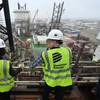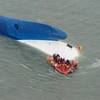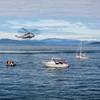National Transportation Safety Board Acting Chairman Mark V. Rosenker said the nation's passenger ferries need aggressive safety management systems. He encouraged ship owners and operators to use a safety management system to resolve safety problems before casualties or incidents occur, rather than to simply comply with regulations imposed from outside.
In his speech he noted that, safety management systems are mandatory for U.S.-flag vessels on international voyages.
The Federal regulations, however, do not apply to U.S.
vessels that operate on domestic waters, including the Staten Island Ferry and most other ferry operations in the country. However, this may be changing, as Congress has mandated that the Coast Guard develop safety management system regulations for domestic towing vessels.
According to the National Ferry Database, ferries operate in 40 states and in some territories. In 2002, ferries operated by 42 agencies carried nearly 58 million passengers and annual ferry ridership exceeded 1 million in five urban areas (Seattle, New York City, San Francisco, New Orleans, and Boston).
"A safety management system necessitates a cultural change in an organization so that the safety of operations is the objective behind every action and decision by both those who oversee procedures and those who carry them out," Rosenker said. "The system leads to standardized and unambiguous procedures for each crewmember, during both routine and emergency operations. Duties and responsibilities are specified for each staff member and for standard and emergency operations. Supervisory and subordinate chains of command are also delineated," he added
An accident can result not only in death or injuries, damage costs, lawsuits, and lost revenues, but also in the distrust of the public who use transportation services. A corporate safety culture for safety equipment, trained and qualified individuals, good crew work-rest cycles, and reliable equipment far outweigh the financial losses of an accident, Rosenker said.
Sponsored Content
Chris-Marine’s solutions help to prolong engine lifetime

AST is now AST Networks, bringing you remote connectivity wherever you are

March 2024
 Read the Magazine
Read the Magazine

 Read the Magazine
Read the Magazine
This issue sponsored by:

Preparing for Change, ABS Enhances the Marine Vessels Rules Book
Subscribe for
Maritime Reporter E-News
Maritime Reporter E-News is the maritime industry's largest circulation and most authoritative ENews Service, delivered to your Email five times per week












